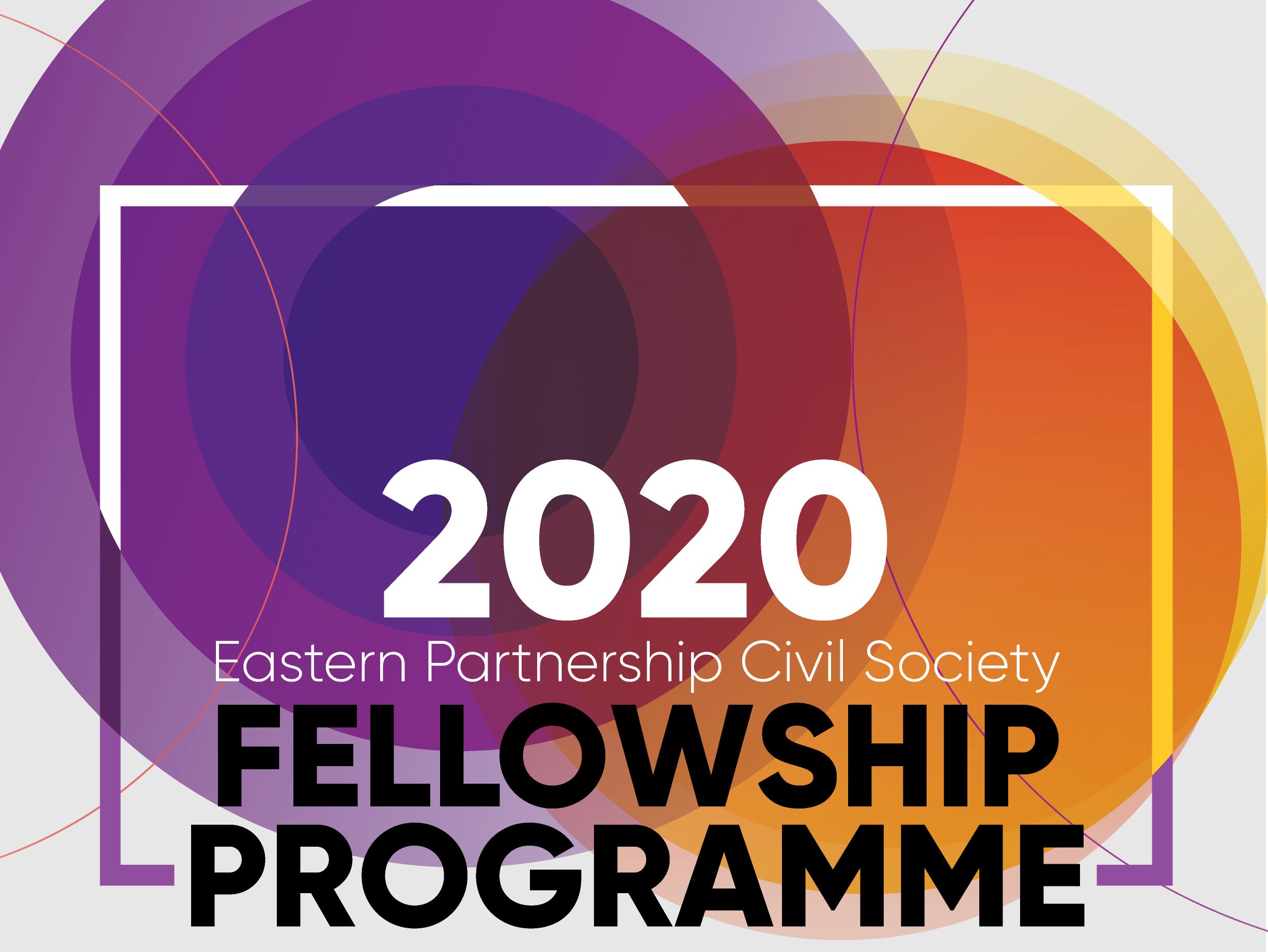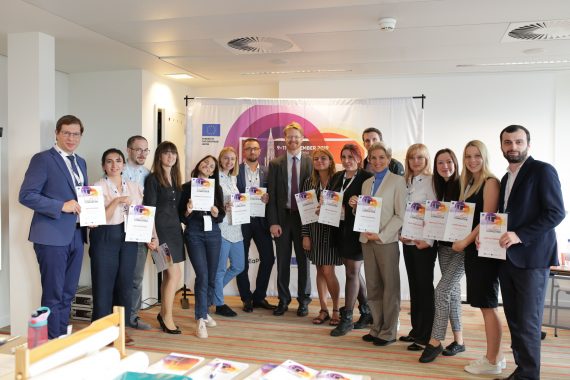 Our world is rapidly changing, and these changes are happening faster now than ever before in history. As future leaders in their countries, we wanted our Civil Society Fellows to reflect on these changes and be engaged in vivid discussions about the future of technology, energy, civil society, the Eastern Partnership initiative and anything else that may play a significant role in the coming years. This is why we decided to bring together the entire network of 60 young talented civil society activists to Brussels in September this year.
Our world is rapidly changing, and these changes are happening faster now than ever before in history. As future leaders in their countries, we wanted our Civil Society Fellows to reflect on these changes and be engaged in vivid discussions about the future of technology, energy, civil society, the Eastern Partnership initiative and anything else that may play a significant role in the coming years. This is why we decided to bring together the entire network of 60 young talented civil society activists to Brussels in September this year.
The Relay Event brought a lot of “interesting insights, eye opening and impactful learnings” for Stas Ghiletchi, one of the EaP Fellows, currently working as public policy expert in Moldova. Stas was surprised and inspired by a talk given by Varoon Bashyakarla, data scientist and researcher at Tactical Tech (Berlin). Varoon is looking into the use of data in political processes around the world and delivered a powerful presentation on easy-to-use and cheap-to-deploy techniques, such as micro-targeting services, that have the potential to be an equalising force but also to create unfair advantages in political campaigns (Personal Data: Political Persuasion – download the publication). By gathering detailed information about users’ identities and individual targeting, political entities can influence people’s political views and voting behaviour.
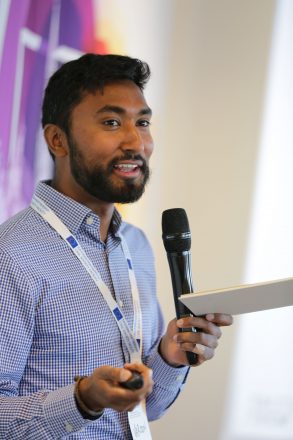
For Stas understanding such issues is crucial, especially as Parliaments around the world, including in the EaP region start debating consumer privacy laws in order to improve the control of citizens’ data online. In a context in which technology advances at an impressive pace, the EaP region cannot afford to lag behind with putting in place the right legislation.
This is why Maksym Mazypchuk, EaP fellow from Ukraine, believes that exploring and mitigating the impacts of technology should be one of the key priorities for civil society in the region. In his opinion, implementing the General Data Protection Regulation (GDPR) in Eastern Partnership countries will be essential for establishing effective public services and good governance. However, the quality of expertise on the GDPR remains low in the EaP countries in general. Maksym considers that Ukrainian CSOs and activists have a low level of digital literacy, especially at the local level.
But no matter how important technology will continue to be in the future and how much more aware we will need to be of its pitfalls, it will not all be about technology. Change cannot come without persuasion and human interaction, without sharing ideas and learning from each other.
And there are few people better placed than Kingsley Aikins to talk about the secrets of connecting with others to get things done. Kingsley is the CEO of The Networking Institute in Ireland and has an impressive knowledge and experience of networking and fundraising for causes which are dear to him. He can easily transport his audience to the US of the 60ies in a smoke filled room with Roy Disney (Walter Disney’s brother) at the table, while at the same time making strong points about the importance of proper research, perseverance and picking the right moment when soliciting support for projects you believe in.
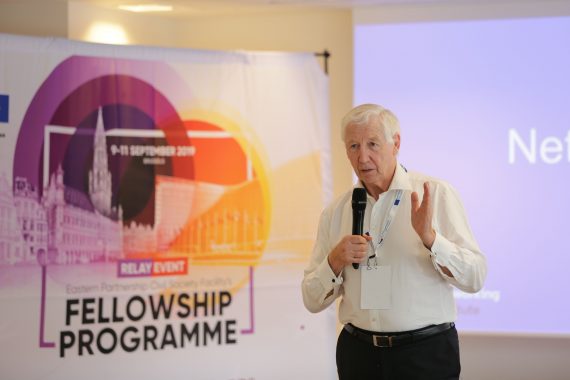
Kingsley also introduced the fellows to the ideas of Harvey Coleman (Empowering Yourself, The Organizational Game Revealed book). According to Coleman how well you do your job contributes to only 10% of your progress. So, to get up the ladder you need two other things: 30% of your career progress depends on your image – what people think of you, what is your reputation, what people say about you when you are not around. And then the largest percentage, 60% of your progress and success, is exposure, which is who knows you, who has seen you in action or performing with other people, who is your mentor, who can speak on your behalf when you’re not in the room. One can argue about these percentage, but the truth is that you need other people, you need to cooperate and interact with them.
One introduction, one conversation can change your life, but according to Kingsley, “There is a process to networking and if you follow the process you get better chances to succeed. A little bit of effort in this area will bring great returns. You have to take actions – you have to change your mindset from being transaction-driven to being relationship-driven; you have to change your behaviour; and you have to learn new skills. You have to do those three little things, but it requires action and most people won’t take that action.”
Kingsley has the ability of good actors to keep everyone enthralled to such an extent that you cannot hear anyone even breathing in the room. Mari Chakryan, one of our fellows from Armenia, and Ismayil Fataliyev from Azerbaijan were under Kingsley’s spell like many of the other fellows. Kingsley’s most ordinary words and phrases gave Mari goosebumps, while Ismayil was impressed by Kingsley’s huge experience and manner of communicating. But one thing is for sure: they will now both know much better how to approach a donor for funding for a project they care about.
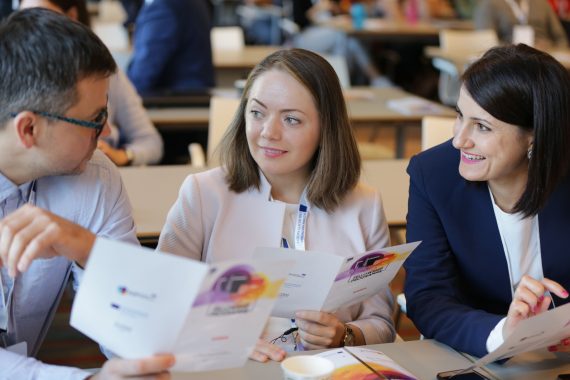 This week in Kyiv we are again bringing some of our fellows together and this time we are working with the team behind the World of Communities game to develop fellows’ decision-making skills, as well leadership style, critical thinking and creativity. The World of Communities game is a co-op strategy board game, which closely models real life and real decision-making, conflict resolution and community development.
This week in Kyiv we are again bringing some of our fellows together and this time we are working with the team behind the World of Communities game to develop fellows’ decision-making skills, as well leadership style, critical thinking and creativity. The World of Communities game is a co-op strategy board game, which closely models real life and real decision-making, conflict resolution and community development.
We will also be bringing one of the tutors behind our online course “Storytelling for Civil Society Organisations” to work with the fellows on using storytelling techniques to better communicate about the impact of their projects.
If any of these things sound exciting, keep an eye on our website and social media because in November we are launching the next call for applications for the Eastern Partnership Civil Society Fellowships 2020!




